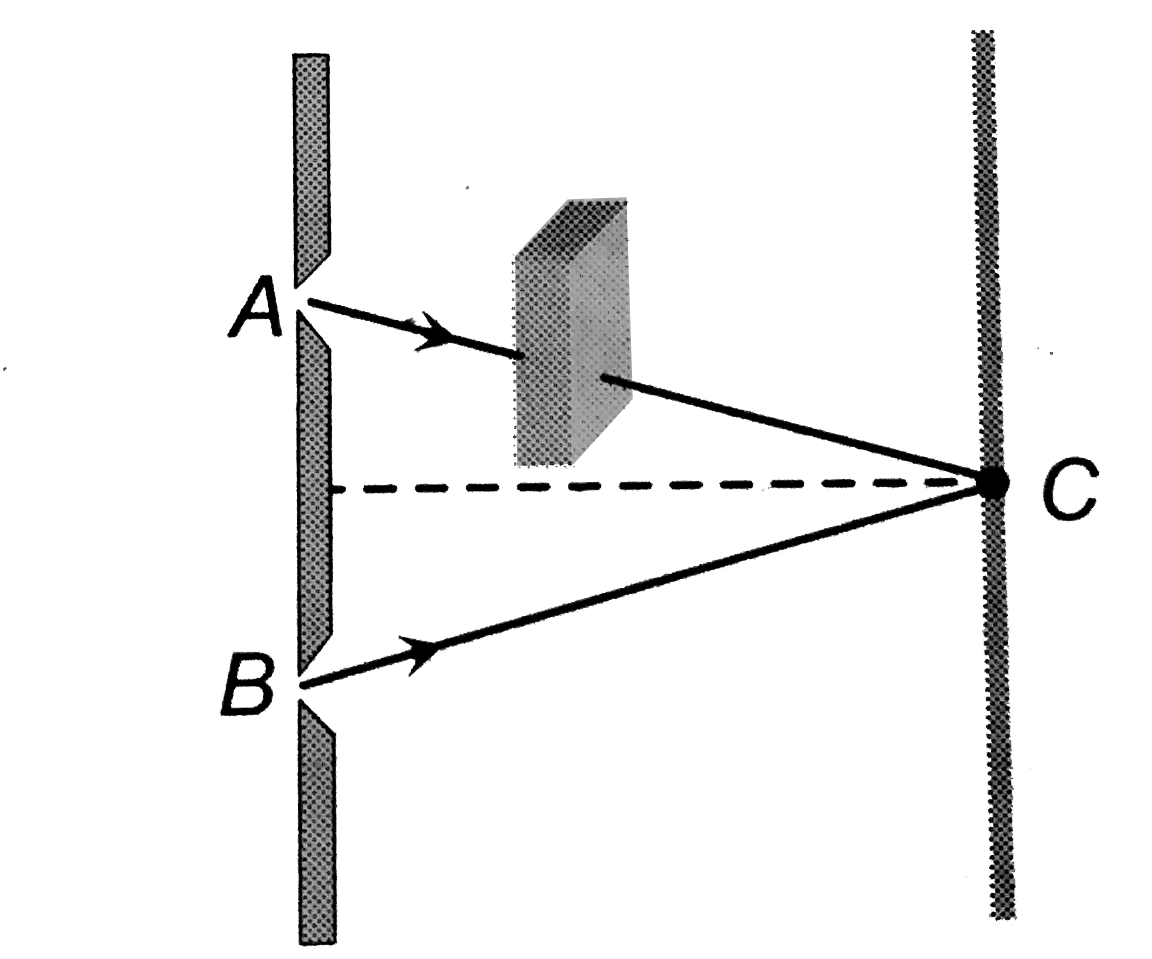In Young's experiment, monochromatic light is used to illuminate the two slits A and B. Interference fringes are observed on a screen placed in front of the slits. Now if a thin glass plate is placed normally in the path of the beam coming from the slit

The fringes will disappear
The fringe width will increase
The fringe width will decrease
There will be no change in the fringe width but the pattern shifts
The correct Answer is:D
The fringe pattern will shift, but no change in fringe width occurs
Topper's Solved these Questions
- BOOK - ERRORLESSCHAPTER - WAVE OPTICS AND ELECTROMAGNETIC THEORYEXERCISE - ASSERTION & REASON27videos
WAVE OPTICS AND ELECTROMAGNETIC THEORY
- BOOK - ERRORLESSCHAPTER - WAVE OPTICS AND ELECTROMAGNETIC THEORYEXERCISE - NCERT BASED QUESTIONS (EM Waves )40videos
WAVE OPTICS AND ELECTROMAGNETIC THEORY
- BOOK - ERRORLESSCHAPTER - RAY OPTICSEXERCISE - Assertion & Reason30videos
RAY OPTICS
Similar Questions
In Young's double slit experiment , red light of wavelength 620 nm is used and the two slits are 0.3 mm apart . Interference fringes are observed on a screen 1.3 mm apart . Calculate (i) the distance of slits from the screen and (ii) the fringe width if this distance is doubled .
View SolutionIn Young's double-slit experiment , the slits are 0.5 mm apart and interference is observed on a screen placed at 1.0 m from the slits. It is found that the 9th bright fringe is at 8.835 mm from the 2nd dark fringe on the same side of the interference pattern. Find the wavelength of light used.
View Solution
Knowledge Check
- Question 1 - Select One
In Young’s experiment, monochromatic light through a single slit S is used to illuminate the two slits S1and S2. Interference fringes are obtained on a screen. The fringe width is found to be w. Now a thin sheet of mica (thickness t and refractive index μ) is placed near and in front of one of the two slits. Now the fringe width is found to be w’, then :
Aw'=w/μBw'=wμCw'=(μ−1)twDw'=w - Question 2 - Select One
A two slit Young's interference experiment it done with monochromatic light of wavelength 6000A. The slits are 2mm apart. The fringes are observed on a screen placed 10cm away from the slits. Now a transparent plate of thickness 0.5mm is placed in front of one of the slits and it if found that the interference pattern shifts by 5mm. The refractive index of the transparent plate is :
A1.2B0.6C2.4D1.5 - Question 3 - Select One
A Young's double slit experiment uses a monochromatic source. The shape of the interference fringes formed on a screen is
A(a) Straight lineB(b) ParabolaC(c) HyperbolaD(d) Circle
In Young's double slit experiment the slits are 0.5 mm apart and interference is observed on a screen placed at a distance of 100 cm from the slits. It is found that the 9th bright fringe is at a distance of 8.835 mm from the second dark fringe from the centre of the fringe pattern. Find the wavelength of light used.
View SolutionIn Young's double slit experiment, if the two slits are illuminated with separate sources, no interference pattern is observed because
View SolutionIn a Young's double-slit experiment, green light is incident on the two slits. The interference pattern is observed on a screen. Which one of the following changes would cause the observed fringes to be more closely spaced?
View SolutionIn Young's double slit experiment, the two slits are at a distance 'd' apart. Interference pattern is observed on a screen at a distance D front the slit, if at a point on the screen, directly opposite to the slits, the first dark fringe is observed, then wave length of the wave will be
View Solution_E01_055_Q01.png)
In a young's double slit experiment, green light is incident on the two slits. The interference pattern is observed on a screen. Which of the following changes would cause the observed fringes to be more closely spaced?View Solution

